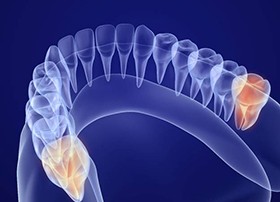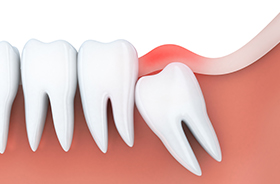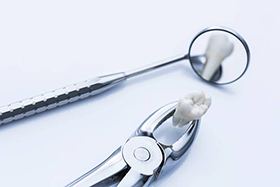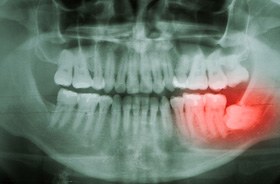Wisdom Tooth Extractions – Auburn, ME
Preserve Your Oral Health
In most cases, we strive to preserve our patients’ natural teeth to the extent possible. However, sometimes it is necessary to perform extractions in order to stop and/or prevent dental problems. That is often true of wisdom teeth. Read on to learn more about what the wisdom teeth are, why they oftentimes need to be extracted, and what you can expect during and after this type of oral surgery.
What Are the Wisdom Teeth?

The wisdom teeth are the third molars at the back of the mouth. They are called the wisdom teeth because they develop much later than the rest of a person’s permanent teeth, when the individual is older and “wiser” than they were previously. It is common for people to develop a total of four wisdom teeth. However, some individuals do not develop any at all, whereas others grow just one or two wisdom teeth. In rare cases, a person may have more than four wisdom teeth; the extras are called “supernumerary” teeth.
Reasons for Wisdom Tooth Extraction

During your routine checkups in our office, we will examine your wisdom teeth and look for any indications that they are causing problems or that they will cause problems in the future. We may recommend extraction if:
- The teeth are impacted (stuck beneath the gum line).
- The teeth are endangering the teeth next to them. Sometimes, the wisdom teeth can push the adjacent teeth out of alignment.
- There are signs of infection or decay. Because the wisdom teeth are so far back in the mouth, it may be difficult to clean them properly. Hence, it is much easier for bacteria and food particles to build up on them and around them.
- You request to have the wisdom teeth removed as a purely precautionary measure. Keep in mind that extracting these teeth is not always necessary; some individuals retain their wisdom teeth for a lifetime and suffer no adverse effects because of it. Also, remember that even though most people get their wisdom teeth removed during adolescence or young adulthood, the surgery can still be performed on older individuals.
The Extraction Procedure

We generally use both anesthesia and sedation to help our patients remain comfortable throughout their wisdom teeth extraction procedure. You should feel very little during the procedure itself. We may create an incision in your gums in order to remove the teeth. Then, we will take them out while disturbing the surrounding tissue as little as possible.
We recommend that you take a few days off of work or school following your procedure so your body can focus on healing. You should also avoid smoking, strenuous exercise, the use of straws, and any hard or crunchy foods that might irritate the extraction sites. Most individuals are able to resume their normal routines within a week to 10 days after their surgery. Of course, if you ever have any questions or concerns while you are recovering, we urge you to call our team right away.
Wisdom Tooth Extractions FAQs

Getting your wisdom teeth removed can seem like a big deal, so we completely understand if you want to gather as much information as possible before you schedule your procedure. To assist you, we have compiled the following list of answers to some common questions about this service. If you would like further explanation about anything you learn here, reach out to our team directly. We look forward to speaking with you!
Does Everyone Have Wisdom Teeth?
Data from 2015 estimates that anywhere from 5% to 37% of people are missing at least one wisdom tooth. Most people, though, have four wisdom teeth — one in each quadrant of the mouth. Rarely, someone may have more than four wisdom teeth.
Researchers do not know exactly why some people never develop their third molars, but the reason is likely related to genetics. Plus, the human race as a whole may be adapting to the fact that these teeth are no longer necessary for survival.
Also, keep in mind that even if you cannot see your wisdom teeth, you may still have them. An X-ray can reveal how many there are and whether they are a threat to your oral health.
How Should I Prepare for My Wisdom Tooth Extraction?
Here are some tips to help you prepare for your procedure:
- Ask your dentist any questions that you may have.
- If you will be sedated, arrange for a trusted friend or family to drive you to and from our office.
- Make sure we have updated information about your medical history and any medications you are taking.
- Do not smoke for at least 12 hours before your procedure.
- Stock up on soft foods to eat in the days after your extraction.
What Is the Best Age to Get Wisdom Teeth Removed?
It is generally recommended that wisdom teeth be removed when a person is a teenager or in their early 20s. After that, the teeth can lengthen and become more strongly embedded in the jawbone, which can make the extraction process somewhat more complex. Older adults may take longer to recover from the procedure than younger individuals.
Of course, there is no upper age limit for wisdom tooth removal. They can be successfully extracted for individuals in their 30s, 40s, and beyond.
Should Wisdom Teeth Be Removed If They Do Not Hurt?
Not everyone needs to get their wisdom teeth removed. In fact, some individuals enjoy a lifetime of problem-free function from their third molars. However, if your dentist recommends that you undergo the extraction procedure, it would be wise to cooperate — even if you are not in pain.
X-rays may reveal that your wisdom teeth are likely to cause problems in the future. For example, they might start to push nearby teeth out of place. They can also lead to cysts, oral hygiene problems, and other issues. Removing them in a timely manner can prevent future pain and complications.
